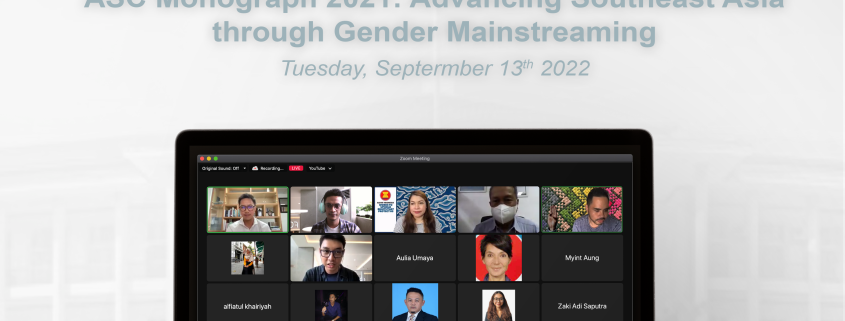Bincang ASEAN on Book Launching “ASC Monograph 2021: Advancing Southeast Asia through Gender Mainstreaming”
Gender inequality is a significant issue in Southeast Asia since most countries are patriarchal and gender-based violence is pervasive. Local grassroots movements for gender equality have grown as a result. One of the discourses that advocacy movements promote to policymakers is gender mainstreaming, a globally inclusive method to make gender equality a reality. Alarming gender-based problems, such as gender-based violence brought on by gender inequity, are seen to be resolved by insisting on a broader gender perspective in the policymaking process.
On Tuesday, September 13th, 2022, the ASEAN Studies Center held a webinar series on Bincang ASEAN to launch the latest publication by the center entitled ASC Monograph 2021: Advancing Southeast Asia through Gender Mainstreaming. The webinar is purposed to disseminate the publication and discuss gender mainstreaming efforts in Southeast Asia. All contributors to the monograph will be invited to the webinar to discuss their findings and complete the discourses on Southeast Asia’s effort in mainstreaming gender alongside the editor and the audience.
To debate their findings and round out the discourses on Southeast Asia’s efforts to mainstream gender with the editor and audience, other contributors to the monograph were invited to the webinar. Author of Chapter 4 Vanesha Febrilly gave an account of the government’s intervention in Setu Garment Factory, West Java, Indonesia to protect the reproductive rights of female garment workers. Mia Hyun, the author of Chapter 6, provided an explanation of a situation of violence against women in ASEAN, focusing in particular on the governance framework for policy reform. Last but not least, Durrotul Mas’udah and Syukron Subkhi, the writers of Chapter 11, discussed the negative stigmas that single mothers in Indonesia endure as well as the community that supports them.
Along with the writers, the editorial boards’ H.E. Yuyun Wahyuningrum from the AICHR and Joel Mark Baysa-Barred from Mahidol University have been invited to participate in the conversation as discussants. Their concluding remarks regarding their support for gender mainstreaming, advocacy, and equality in the ASEAN Region brought the discussion to a close.
Regionally, member state collaboration on the eradication of gender-based worrying concerns is limited, notwithstanding ASEAN’s initiative on gender mainstreaming via the ASEAN Gender Mainstreaming Strategic Framework. The gender awareness and commitment of ASEAN member states are also in doubt given Southeast Asia’s patriarchal culture. In the region, efforts to eradicate issues like the violence that is gender-based have not made much success. It inspired ASEAN to take on a bigger role in supporting member nations’ dedication to gender mainstreaming and fostering collaboration to end gender-based challenges.
Report by
Syukron Subkhi
Media and Publication Officer
ASEAN Studies Center UGM



